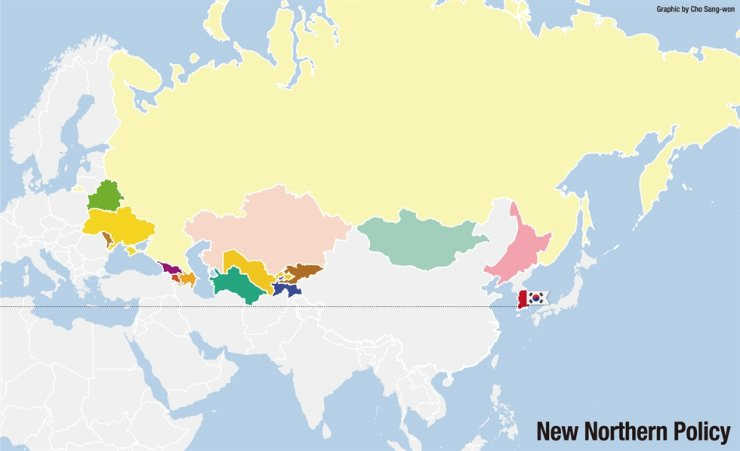Emerging Markets Daily - August 22
Bullish Bets on EM Equities Rising, Afghanistan's Two Decades of Progress, S. Korea's 'New Northern' Policy, Asia Merger Activity, Malaysia Old Guard Returns to Power
The Top 5 Stories Shaping Emerging Markets - August 22
Bullish Bets on EM Equities Rising; Is ‘Lost Decade’ Over?
Bloomberg
“Elevated commodity prices and expectations for earnings growth are igniting bullish bets on emerging-market equities after more than a decade of underperformance that left them approaching a 20-year low against developed-nation stocks.”
“Goldman Sachs Group Inc., Bank of America Corp. and Lazard Asset Management expect a boost for developing equities as investors capitalize on cheap valuations once vaccine rollouts pick up, helping the global economy to recover from the pandemic. South Africa, Russia and Brazil are among markets set to benefit, even as China’s regulatory crackdown continues to weigh on Asian equities.”
“In the decade following the global financial crisis, MSCI Inc.’s emerging-market stock index gained just 8%, while the benchmark for developed nations more than doubled. That’s partly due to the slowdown of Chinese economic growth from above 10% in 2010 to around 6% by the end of the decade, resulting in a decline for commodity prices and weak earnings growth.”
“There are signs the turn has already started. Capital flows into emerging-market equities in Eastern Europe, the Middle East and Africa accelerated since March -- beating flows into bond funds by the most since 2014 -- as investors rotated into value stocks, according to BofA.” Bloomberg reports.
The Afghan Economy in Charts: What has Changed in Two Decades?
Financial Times
“In the two decades since the Taliban lost control of Afghanistan living conditions have improved markedly, including huge progress in healthcare, education, life expectancy and child mortality.”
“But endemic corruption and violence slowed the pace of progress, and the scaling-back of troops and aid in recent years reduced one of its biggest sources of revenue, with economic consequences.”
“Afghanistan’s former central bank governor Ajmal Ahmady, who fled the country last weekend as the Islamist group returned to power, told the Financial Times that anyone who played down the improvement in the lives of Afghans ‘belittles the change that has happened’.”
Valentina Romei reports
South Korea’s New Northern Policy Shows Some Results
The Korea Times
“President of Kazakhstan Kassym-Jomart Tokayev visited Korea last week, becoming the first foreign head of state to visit Korea since the outbreak of the COVID-19 pandemic, underscoring the significance of the Central Asian country in Korea's New Northern Policy.”
“…The New Northern Policy was established by Moon back in 2017 with an aim to strengthen economic and political cooperation with countries to the north of Korea. President Moon also launched the Presidential Committee on Northern Economic Cooperation to engage more actively with countries in the region covered by the policy.”
“The policy focuses on region-specific technology cooperation to deal with a variety of countries: from those of Eastern Europe to neighboring Russia and China. The focus for the Western Region, including Western Russia, Ukraine and Belarus, is technological cooperation in high-tech industries, while the focus of the Eastern Region, which includes the Russian Far East and the three northeastern provinces of China, is on building more substantial political and diplomatic partnerships with reinforced economic cooperation.” Kwon Mee-yoo reports
Merger Activity in Asia Remains High Even as Regulatory Uncertainty Hangs over Tech Sector
South China Morning Post
“Merger activity remains high in Asia, including China, against the backdrop of Beijing’s ongoing regulatory crackdown on the technology sector, which has heightened concerns among investors, according to one of JPMorgan Chase’s top bankers in the region.”
“The level of activity is the same as it was coming into the year, if not ‘a little bit more intense’, according to Kerwin Clayton, JPMorgan’s Asia-Pacific co-head of mergers and acquisitions (M&A).”
“‘A more challenging deal sentiment towards some sectors can lead to a misconception that things are slow broadly and that just hasn’t been the case. A big difference in China is that five years ago there were a limited number of sectors where M&A was active. Now, M&A, in some form, is happening in all sectors,’ Clayton said. ‘These counterbalance, if not overcompensate for the areas that might be slower at any time.’” Chad Bray reports
Malaysia's Old Guard Returns as Ismail Sabri is Sworn in as PM
Nikkei Asia
“Ismail Sabri Yaakob was sworn in as Malaysia's ninth prime minister on Saturday afternoon, marking the return of the country's scandal-plagued old guard amid a relentless COVID-19 crisis.”
“The 61-year-old became the country's third premier in the three years since the last federal election in 2018. Clad in a Malay traditional costume called baju melayu and accompanied by his wife and children, Ismail Sabri took the oath in front of King Sultan Abdullah Ri'ayatuddin.”
“Ismail Sabri hails from the United Malays National Organisation (UMNO), which led the country for about six decades before it lost that 2018 election under swirling suspicions of corruption, especially the embezzlement scandal involving now-defunct state fund 1Malaysia Development Berhad (1MDB). Several key figures from the party, including former Prime Minister Najib Razak, are still facing graft and abuse of power allegations in the courts.” P Prem Jumar reports
What We’re Also Reading….
Brazil President Denies Speculation of Crisis With Central Bank
Bloomberg
“Brazilian President Jair Bolsonaro’s chief of staff denied speculation of a crisis building between him and Roberto Campos Neto, the country’s central bank chief, calling it an ‘imaginary bonfire.’”
“Bolsonaro expressed regret for signing a law that gave formal autonomy to the central bank, according to the Associated Press. The news agency reported it wasn’t the first occasion that the president has expressed the desire to interfere in the country’s monetary authority.”
“…The central bank is aggressively raising interest rates this year to bring inflation back to target -- it has delivered a total of 325 basis points in hikes so far and promised another full percentage-point increase for next month.” Mariana Durao reports









